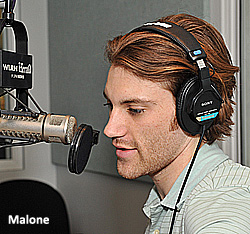Author: Karen Everhart
Karen Everhart is managing editor and interim executive director of Current, supervising the editorial and business teams, freelance contributors, designers and student interns. As a reporter and senior editor over two decades, she covered every major beat — public TV, CPB, public radio and the evolution of public media's digital service strategies. After her promotion to managing editor in 2012, she helped lead Current's transition to digital-first publishing. Karen was appointed interim E.D. in April 2025.
After scandal, fundraisers debate ethics
Having witnessed the damaging one-round knockout of NPR fundraiser Ron Schiller in March, public radio’s development pros are working to adapt the ...July 11, 2011Life without CPB aid scary to Local Journalism Center startups
The seven Local Journalism Centers that launched with major support from CPB have suddenly found themselves on a short timeline to find ...July 11, 2011Appropriation cut, lack of channel doom FM for young Latino L.A.
Los Angeles Public Media, the CPB-backed startup that hoped to serve a new generation of minority listeners in one of the nation’s ...June 27, 2011Georgia ramble turns exposé
Ira Glass didn’t know what he was in for when he walked into the post office in the seaside burg of Brunswick, ...June 13, 2011Sale closes on Palm Beach’s WXEL-FM
Florida’s WXEL-FM, the public radio station that broadcast on 90.7 FM in Palm Beach, has been converted into full-time music outlet WPBI, ...May 26, 2011‘Required’ station fees for web services are just a ‘proposal,’ says NPR Board chair
Plans to restructure NPR’s digital services to pubradio stations, in the works for months, have finally gotten down to specifics: what NPR ...May 23, 2011Radio joins local probes, ruffles local feathers
WLRN Radio and the Miami Herald have been collaborating on multiplatform news production for eight years, but the investigative-reporting package that they published this ...May 16, 2011State after state decides how much to cut system aid
In state capitals, public broadcasting advocates have been fighting uphill battles to preserve a key piece of stations’ revenue puzzle.April 18, 2011Authorities probe for arson in Little Rock transmitter fire
Federal agents from the Bureau of Alcohol, Tobacco and Firearms are investigating an April 2 transmitter fire at KUAR in Little Rock, ...April 18, 2011The right jabs public radio with video sting using NPR fundraiser’s words
Neither Ron Schiller nor Betsy Liley had eaten before at Café Milano, the upscale see-and-be-seen restaurant in Georgetown, before Feb. 22, when ...March 21, 2011STING: The Right jabs pubradio with NPR fundraiser’s words
Neither Ron Schiller nor Betsy Liley had eaten before at Café Milano, the upscale see-and-be-seen restaurant in Georgetown, before Feb. 22, when ...March 21, 2011NPR loses c.e.o., its third exec swept away by political tornado
One day after denouncing her top fundraiser and nine weeks after asking her news chief to resign, NPR President Vivian Schiller stepped ...March 9, 2011Wits: Writers banter, tweeters tap in new MPR variety show
After a four-show trial run last spring, Minnesota Public Radio is mounting another season of Wits, its concept for a next-generation stage-show broadcast ...March 7, 2011NPR sees new roles for Public Interactive
NPR is proposing to give public stations more help in building and maintaining dynamic websites and mobile apps by reconfiguring its Boston-based ...March 7, 2011Broadband rising on Native agenda
Native Public Media, a minority consortium incubated within the National Federation of Community Broadcasters for seven years, is striking out on its ...February 22, 2011



